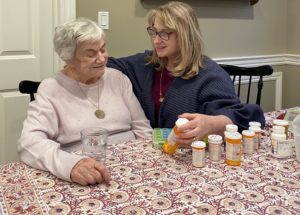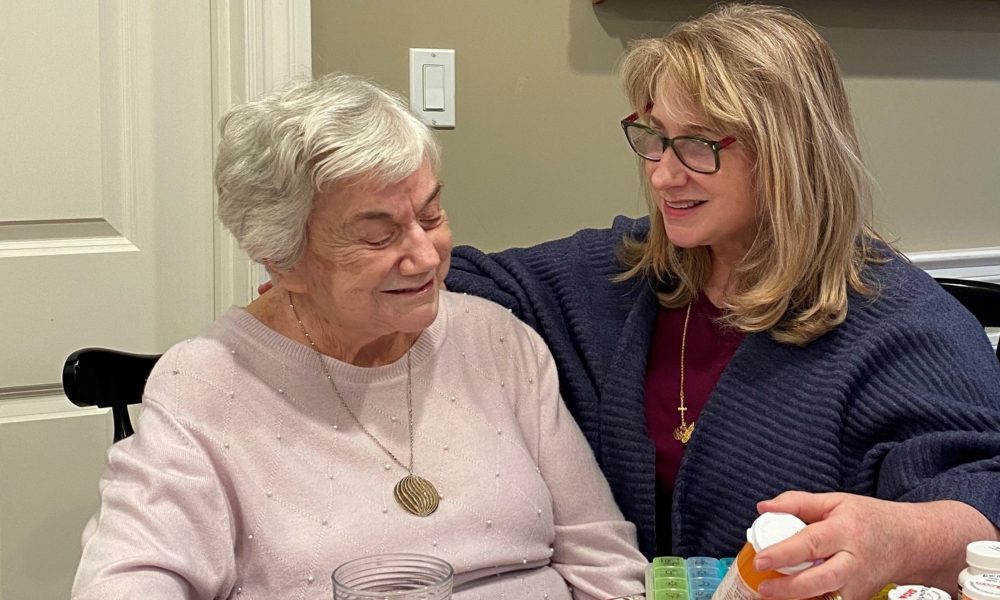Anni Hmelar works for the Council on Aging and commutes between Bend, Oregon, and Palo Alto, California, to take care of her 87-year-old mother. In this interview, Hmelar shares some of the struggles millions of working caregivers face in finding support while balancing a career and the needs of an older loved one.
What is the hardest part about being a caregiver as well as a working professional?
The phrase “work life balance” comes to mind. There are physical and intellectual aspects to both areas of my life, and there are many days when it feels as if I am failing in both arenas. And that is hard psychologically, especially as I’ve been achievement oriented for more than four decades of adulthood.
My husband and I don’t have children, which was one reason I was more able than my siblings to become Mom’s primary care person. We had been living overseas, but we returned to the U.S. and moved into her home, so she would have more day-to-day support and not have to move into a senior community. As a family, all of my siblings and I assured her that she would never have to do that.

At first, I felt pretty confident working on my professional assignments, because I could flex my working schedule around Mom’s few doctors’ appointments and other obligations, say with a lawyer or a banker. The caregiving was also interesting, because I was learning new skills from her. She’s a former nursing educator, so she would teach me how to do things in support of her conditions. I enjoyed that learning curve—it’s just part of my nature to want to learn new things. So it felt very win-win; I was spending quality time with her, acquiring new skill sets, and that was enabling her to stay at home.
But as her physical health and cognitive abilities have diminished, as she’s becoming more frail and forgetful, there are days when I can see her struggling with that diminishment, that loss of control. On those days, she becomes particularly demanding.
I cannot even begin to imagine the effort and stress that go into work/care situations for the “sandwich generation” of people who are caring for children and older loved ones. The lack of sleep, the constant vigilance about another person’s safety and well-being, the negotiations that go on between wants, needs, and expectations. With children, the trajectory is growth and increasing independence. They’ll be launched into their own adult lives. Yet when caring for older adult loved ones, your own life gets smaller, especially as the elder’s dependence is increasing. You, the caregiver, are managing toward a one-way, irrevocable end state. Most of us aren’t trained to do that.
As a caregiver, what support do you need in your professional life?
I am fortunate that my job allows for day-time flexibility, so I can mostly work around my mom’s appointments and day-time needs. However, during a recent hospitalization over the holidays, I had to give up vacation days to be with her, to be in on consults and family meetings, which are occurring at all times of day. Also my siblings, husband, and I took turns sleeping on the floor in her room, because she was very disoriented and challenging—she wanted to be the nurse in charge of all the other patients. She was asking us to pull their charts, to rearrange their positions in bed, etc. That five-day episode was particularly challenging and caused my own processing power to diminish. My work was definitely suffering. You want colleague’s to show empathy and emotional support for your circumstance, but you also realize that some of their work is hinged on what you’re able to deliver, so it feels as if all they systems around you are collapsing. It’s a tricky, frustrating, demoralizing dance. I still don’t have it sorted.
What support do you need in your personal life?
Sleep is a big factor. I hadn’t realized how much sleep patterns changed for Mom—and as a result, for me. She gets up around 2 a.m. most mornings. So I’m either getting up to ensure she’s safe—she’s had a number of falls in the past few years, which is why we want to help with that—or listening for her to call out for help. There have been a number of occasions in the past year where her 2 a.m. calls for assistance have led us to ER visits and some ensuing hospital stays.
What do you wish other people knew about caregiving?
Working caregivers need support. Caregiving is complex and demanding, especially if you and your loved one are living for a long time with a chronic and or deteriorating condition, such as Alzheimer’s or dementia. Carers will need to develop skills in nursing, banking and legal matters, and understanding how to make home and physical movement increasingly safe for the loved one. And while patience may be a virtue, it can be hard to muster after standing by in hospital waiting rooms, online with Medicare or long-term care companies, and in the moment when your loved one is particularly challenging. You need back-up from family and or professional organizations who can let you step away, even if only for an afternoon, so your life feels a bit bigger.
Limited resources and increased demand for the Council on Aging’s caregiver support programs mean some working caregivers in need of assistance may have to wait for support. To help care for working caregivers through the Council on Aging’s caregiver support programs, donate, volunteer, or get involved in the conversation on Facebook.
How can we, as a society, better support caregivers?
Personally, working caregivers need respite care, and social and emotional support for the losses they’re experiencing—in free time, freedom of movement, freedom to prioritize their own lives. Friends, family members, nonprofits and for-profits are doing what they can, but resources are limited. Caregivers need to look after themselves; you cannot provide good care without your own physical and mental well-being in place. We carers need a way to figure out how to do that for ourselves.
Professionally, we as a society are not set-up to deal with the onslaught of caregiving that will be required of our communities. Most personal bankruptcies in the U.S. today are occurring because of the high cost of medical care. Public policies for care require the selling of assets—including a home—and exhausting those proceeds, in order to qualify for medical assistance. So the older vulnerable person is forced into low economic means, forced out of their home, and forced into a care network that has limited resources. The U.S. is one of the richest countries in the world, and we have yet to set-up equitable health care systems that allow vulnerable populations to be supported with sustained care, and that’s another tragedy.
We are also facing huge challenges in educating enough medical folks—all the way from doctors to certified nursing assistants. There is a dearth of appropriate medical care resources—and that’s a set-up for failing our elders—and ourselves—in later life.
~
The Council on Aging believes in a world that ages better, together. Supporting caregivers requires a community and public policy effort, including more resources and focus on:
- Caregiver respite programs
- Caregiver support groups
- Caregiver training
- Adult day care centers
- Health insurance that covers care costs
What else do caregivers need? Leave a comment below or join the conversation on Facebook. You can also donate today to help the Council on Aging advocate for caregivers.


